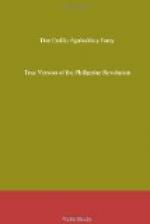On the 4th July the first United States military expedition arrived, under command of General Anderson, and it was quartered in Cavite Arsenal. This distinguished General called on me in the Filipino Government House at Cavite, an honour and courtesy which I promptly returned, as was right and proper, seeing that we were friends, of equal rank, and allies. In the course of official intercourse General Anderson solemnly and completely endorsed the promises made by Admiral Dewey to me, asserting on his word of honour that America had not come to the Philippines to wage war against the natives nor to conquer and retain territory, but only to liberate the people from the oppression of the Spanish Government.
A few days before the arrival of this military expedition, and others that followed under command of General Merritt, Admiral Dewey sent his Secretary to my Government to ask me to grant permission for the stationing of American troops in Tambo and Maytubig, Paranaque and Pasay. In view of the important promises of Admiral Dewey, above mentioned, the Dictatorial Government consented to the movement of troops as proposed.
During that month (July) Admiral Dewey accompanied by General Anderson visited Cavite, and after the usual exchange of courtesies he said—“You have had ocular demonstration and confirmation of all I have told you and promised you. How pretty your flag is! It has a triangle, and is something like the Cubans’. Will you give me one as a memento when I go back home?”
I replied that I was fully satisfied with his word of honour and of the needlessness of having our agreement in documentary form. As to the flag he wanted, he could have one whenever he wished.
The Admiral continued: Documents are useless when there is no sense of honour on one side, as was the case in respect of the compact with the Spaniards, who failed to act up to what had been written and signed. Have faith in my word, and I assure you that the United States will recognize the independence of the country. But I recommend you to keep a good deal of what we have said and agreed secret at present. I further request you to have patience if any of our soldiers insult any Filipinos, for being Volunteers they are as yet undisciplined.
I replied that I would bear in mind all his advice regarding cautiousness, and that with respect to the misconduct of the soldiers orders had already been issued enjoining forbearance, and I passed the same remarks to the Admiral about unpleasantness possibly arising through lack of discipline of our own forces.
CHAPTER XI
The Spanish Commission
At this juncture the Admiral suddenly changed the topic of conversation and asked—“Why don’t the people in Manila rise against the Spaniards as their countrymen in the provinces have done? Is it true that they accept the autonomy offered by General Augustin with a representative Assembly? Is the report which has reached me true, that a Filipino Commission has been sent from Manila to propose to you the acceptance of that autonomy coupled with a recognition of your rank of General, as well as recognition of the rank held by your companions?”




